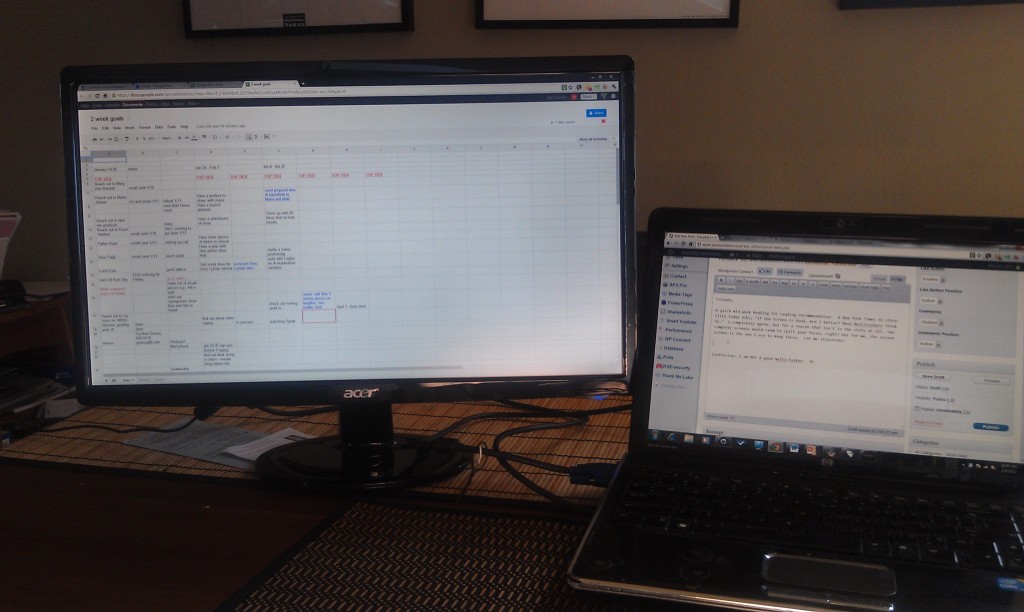A quick mid-week Reading for Leading recommendation: Buy a second screen for your computer! A New York Times 1A story title today asks, “If One Screen Is Good, Are 3 Better? Many Multitaskers Think So.” I completely agree, but not for the reasons in the story. In the article people – some of whom have 3, 4 or 6 screens, yeesh! – say they can quickly switch screens without toggling and this increases their speed.
My problem isn’t having too little speed to change my focus. My problem is too much easy speed. My problem is having ready access to a million DISTRACTIONS. I’m at least a little ADD, and my family would say a lot! So, why would I or others who get distracted want a second screen, you ask?
Because my big screen is my focus screen. You can see in the picture that my big screen has a GoogleDoc spreadsheet with my two week goals and tasks. I may have 20 windows open on my laptop screen, but I always keep my main thing the main thing, and it’s right there; I never have to search for it.
This cheap innovation (here’s an amazon link to 20-inch monitors that sell for just over $100) has led to huge productivity gains for me. It might help you to
Lead with your best self!
Dan


Stardock in Plymouth Michigan has developed a terrific and affordable program called Multiplicity Pro which will allows you to control multiple computers such as a laptop and a desktop with a single keyboard and mouse and lets you copy and paste folders/files between machines.
I thought it would be technically complex to add a second monitor. It’s not. Although Stardock may be great, all you have to do is change simple settings in Windows Display and you’re good to go. I use three different monitors depending on wehther I’m home or at one of my two offices; all I have to do is plug in one cable and I’m up.
“Time is what we want most, but what we use worst.” William Penn
Multitasking has become a byword for success these days. We scan the Internet while talking on the phone, then get interrupted by call-waiting. We make cell phone calls to schedule appointments when caught in traffic. We text message friends while standing in line at the bank. While waiting for dinner to cook, we help kids with their math and jot down a list of things to do the next day. The myth that multitasking works has never been stronger.
Note the word “myth.”
Neuroscientist Earl Miller tells us, “The brain is very good at deluding itself and for the most part, we simply can’t focus effectively on more than one thing at a time. Consider talking on the phone and emailing at the same time. Those things are nearly impossible to do simultaneously. Both involve communicating via speech or the written word, and so there is a lot of conflict between the two of them.”
He adds, “Yet an entire generation of web workers has been raised on the idea that the more activities we can do at one time, the more of a productivity superstar we are. But is the ability to juggle “Facebooking” a friend while scanning an email, texting on your cell phone, and tweeting about your latest technology tip really such a good idea?”
A growing body of evidence suggests that trying to do two or three things at once or in quick succession can take longer overall than doing them one at a time—and the process may actually leave us with reduced brainpower to perform each task well.
As a writer/editor two screens are invaluable when comparing two documents for editing and rewriting.Almost everything I do is more efficient since I added a second screen. Highly recommended.
I’m interested in finding out more about the GoogleDoc spreadsheet you used with your two week week goals and tasks. Something like that might be very helpful to me. I’m not interested in your data, just the format including headers etc.
Thanks
Al
I always visit your blog and retrieve everything you post here but I never commented but today when I saw this post, I couldn’t stop myself from commenting here. Wonderful mate!